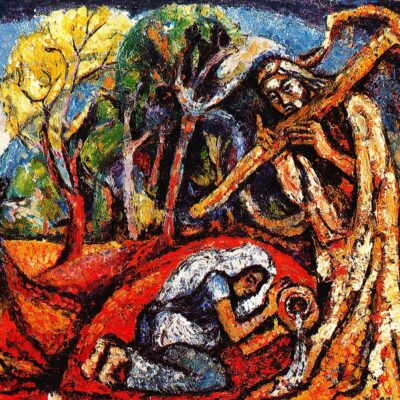Second Sunday in Lent
Readings: Genesis 15:1-12, 17-18; Psalm 27; Philippians 3:17-4:1; Luke 13:31-35
The past few weeks we have been listening to Jesus as he teaches and demonstrates his views on leadership, authority, core values and the call to love your enemies. We heard him preach to crowds in the “Sermon on the Plain” which is Luke’s version of the Sermon on the Mount. We peeked up between the clouds to see him with Moses and Elijah while he was transfigured before Peter, James and John and heard God command them (and us) “This is my beloved Son, the Chosen, listen to him.” And last Sunday, the first Sunday in Lent, we travelled into the wilderness with him to overhear his interaction with the devil and the temptation to greatness, acclaim and power.
In all of these teachings and journeys, Jesus has been away from the centers of power, preaching to fishermen and the poor, encountering gentiles in areas where the population was mixed, wandering in uninhabited places, away from human contact and utterly dependent upon God. Jesus used his place at the margins of Jewish society, religious practice and political power to usher in a new way, the way of God and God’s Kingdom.
From his humble birth at Bethlehem all the way to the Mount of Transfiguration, he has preached and lived a way of being with God that is intimate, humble, compassionate and self-giving. Those who are attracted to him are often puzzled by him and wish he might exert more force and influence. But they love him and they want to follow him and learn to be more like him. He is compelling, irresistible and utterly unique. He may be even greater than Elijah or Moses. Perhaps he is the Messiah as Peter boldly proclaims.
Now, as Jesus “turns his face towards Jerusalem” and journeys towards the capital city, the heart of Jewish religious observance at the Temple, the center of Roman rule and occupation where the Roman Governor and the nominal Tetrarch Herod of Antipas conduct their business, Jesus is coming into direct confrontation with the political and religious rulers in Israel. We all know it will not end well. And so does Jesus.
So it is that some of the Pharisees seek Jesus out to warn him to run away. Remember that not all Pharisees were absolutely opposed to Jesus and it is likely that many respected him and were intrigued by him. But they knew how the wind was blowing in Jerusalem and that Herod wasn’t going to stand for anyone who called his bad behavior out or upstaged him. After all, it was this Herod who had boldly and against all religious and cultural norms wooed his own brother’s wife. And when John the Baptist was bold enough to call him out on it, Herod caved into his own bravado and weakness for beautiful women by agreeing to present John’s head on a platter to his second wife. Vengeance, retribution, lust are all attributes of Herod’s character. One historian described him in this way, “a petty tyrant with a touch of megalomania, paranoid, callous, in cahoots with the Romans, religious but in a conniving way, rich, and often cruel.” James C. Howell in Connections.
Is it any wonder that Jesus refers to him as “that fox?” It probably does a disservice to foxes to associate such a man with them, even metaphorically.
In contrast, Jesus considers the many inhabitants of Jerusalem. He knows that religiously observant Jews from all over the world make pilgrimage to Jerusalem to be as close as possible to the holy of holies at the center of the Temple. He is achingly aware of the poor, disabled, diseased and ostracized who come seeking healing and restoration into community through the proclamation by a priest. He has been greeted by the desperate and hopeful parents of ill, possessed or even dead children and has railed against the principalities and powers that would destroy God’s beloved ones.
When Jesus sees Jerusalem, he doesn’t see a great city to conquer, nor does he see a wicked metropolis that he must purify. He doesn’t want to break into song like Frank Sinatra and declare himself “king of the hill, top of the heap, top of the list.” Nor does he want to see Jerusalem destroyed as Jonah prayed for when he was sent to the wicked city of Nineveh. After all Jerusalem has been the city that kills the prophets and stones the messengers God sends to them. No, Jesus has something else entirely in mind.
Jesus uses one of the most unusual and tender images to describe his desire and approach to Jerusalem. He longs to gather this huge, diverse, beautiful, damaged, complex city and all its inhabitants under his wings as a mother hen does to protect her children. He KNOWS he’s going up against at least one fox and he wants to be a chicken. What’s going on? Is he nuts?
When Herod looks at his subjects, he is acutely aware of his precarious situation. He is Jewish but he’s being used by the powerful Roman occupiers and he owes his power to them. Herod sees the citizens of Jerusalem as threats to be neutralized or punished, or as prey for exploitation. He is only interested in his own welfare. Ultimately everything he does is for his own benefit. He rules out of fear and distrust and it makes him very dangerous.
The rule of Jesus is the rule of love. It involves sacrificial service. It is self-giving rather than self-serving. Jesus seeks to nurture and protect those who have been given into his care. Even from the cross he continues to show love by placing his mother into the care of his beloved disciple Jesus so that they might support one another in their grief and loss. He weeps over the death of his friend, Lazarus. He prays for those who have wounded, mocked and killed him, including Herod of Antipas, “Father, forgive them.” And this, all of this, makes him vulnerable.
Some of you may have been following, along with me and thousands of others, the live action camera in Big Bear Valley, California. For the past 6 or 7 years a nesting pair of bald eagles has returned every winter to a nest high up in a pine tree where a camera records the action 24/7 without interfering with their lives. This year, the pair, Jackie and Shadow laid, brooded and hatched 3 eaglets. The eaglets were born just a couple weeks ago and are extremely vulnerable little balls of grey fluff. They are utterly dependent on both their parents for warmth, protection from predators and especially, food which is caught, brought and placed into their tiny beaks.
I confess that I have been a bit obsessed with them, checking in regularly to observe the hard work and dedication of the parents and the growth of the chicks. But this past Thursday a tremendous storm barreled down upon the area, burying everything in two feet of snow and blowing gusts of up to 80 mph. Just ahead of the storm, Jackie and Shadow brought up extra fish and fed all the chicks until they couldn’t eat any more. And then Jackie carefully tucked them under her body and settled down.
We watched through the night as the tree blew back and forth and we heard the bows creaking. Jackie became completely covered in snow, with only the yellow of her beak barely showing. As the snow level started rising around them, she stretched out her wings, creating an umbrella of her body to make enough dry, warm space for the eaglets to survive.
We watched the snow and wind continue the next day, grounding her mate Shadow and making it impossible to take nourishment or provide any for the eaglets. She sat on the nest for over 24 hours straight without a break and when Shadow was finally able to take over for a short time, she returned after a quick break to place her larger body as protection for her children. It’s not clear if all three of the eaglets survived this terrible storm, but at least two are up again and able to be fed as the wind and snow has died down.
No one would confuse a hen with an eagle. Eagles are apex predators with a majestic look. They are the symbol of our nation and emblazoned on everything from government seals to patriotic garb. And yet, a hen protecting her chicks is just a fierce, dedicated and willing to risk herself for her chicks as an eagle mother is. Fierce love is a characteristic of those who would give themselves for another willingly, suffering, sacrificing, even dying for the sake of another.
When Jesus compares himself to a mother hen, it is not a metaphor of weakness but of strength and power. He may not command armies, terrorize his own citizens, manipulate systems for his own purposes or corrupt the values of the people, but he will still be hailed as the King of Kings, Lord of Lords, the Holy One of God. He will be worshipped and adored even as he is hung upon the cross. Anyone who encounters him will have to make a choice on whether or not to follow his way of love or to walk in the way of the world, the way of dominance and subjection.
Each one of us has promised at baptism to “preach the good news of God in Christ by word and example.” Prophetic voices are still speaking and still being persecuted. When we hear the voices that align with the leadership, authority and loving example of Jesus, how can we amplify them? How can we preserve, protect and magnify the prophetic witness in our age? How might we imitate the fierce love of Jesus, our mother hen, and provide shelter for the vulnerable? To the worldly powers, our Christian practice may seem weak or useless. We may feel like we’re all alone in the middle of a fierce storm, hanging on for dear life. But dear friends, we are the body of Christ. We bear in our very selves the same heart of Jesus and the power of God’s Spirit. Weeping may endure for the night but joy cometh in the morning. And it will find us faithful, prayerful, loving and fierce. Amen.




Leave a Reply